Top 15 Automated API Testing Tools 2025
Learn with AI

The number of API testing tools on the market for you and your team to try out and select will probably take forever. Here are several key considerations to keep in mind when choosing one:
- Basic API Requirements: Does it support the majority of HTTP requests? Can settings and artifacts be imported across projects to save time?
- Complexity: Ensure your team can learn and use the software quickly.
- CI/CD Integration: Check its integration list—does it work natively with tools like Jenkins or Bitbucket?
- Interoperability: Can it connect with Slack, Jira, Git, or your team's toolchain?
- Non-technical Friendly: Review documentation to ensure it supports BDD and exports clear reports.
Top 15 API testing tools on the market
According to the State of Quality Report 2024, Katalon Studio, Postman, and JMeter lead the market with:
- Katalon Studio loved by 37% for its versatility across any AUT.
- Postman favored by 45% as a strong API test solution.
- JMeter chosen by 31% for performance testing capabilities.
See the comparison table below, including REST-assured and Apigee—also strong candidates. 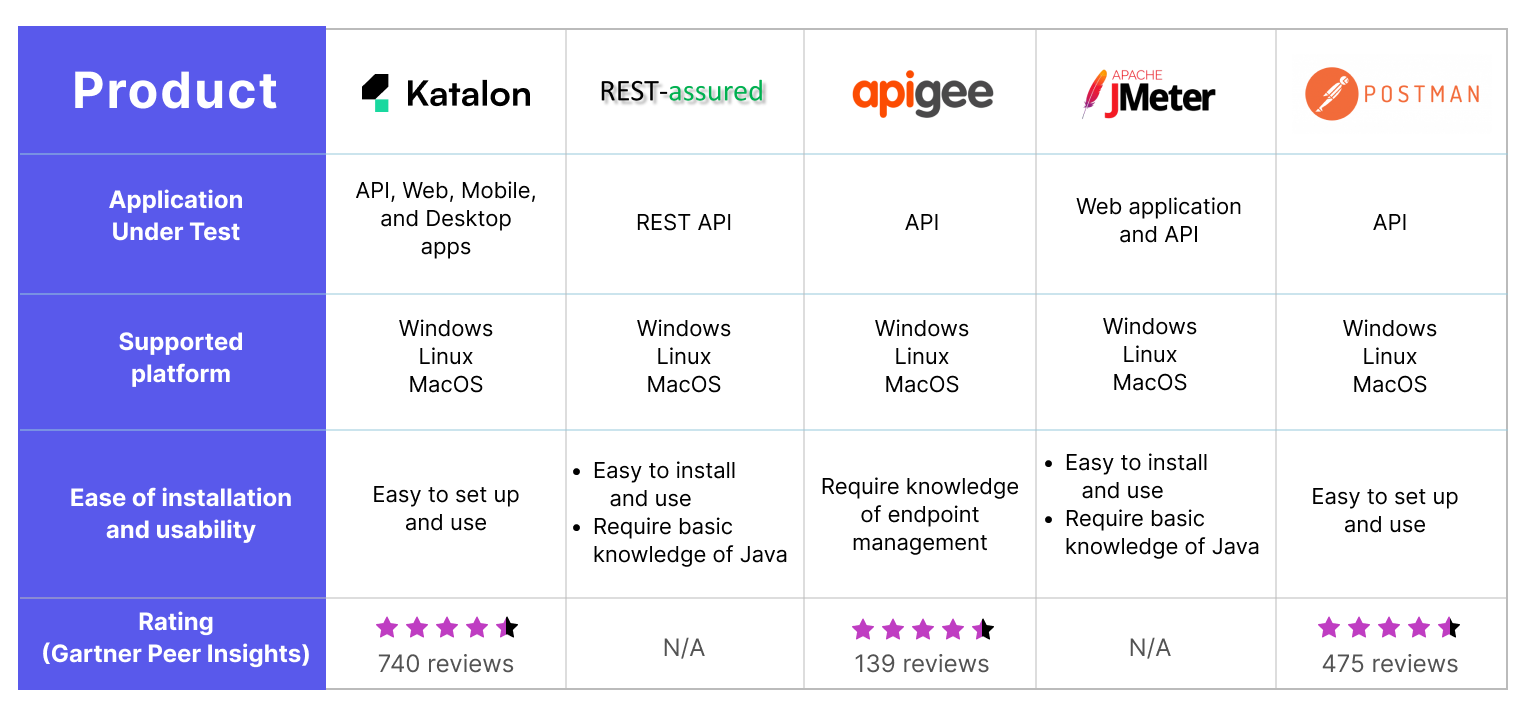
1. Katalon (Best for UI + API automation testing)

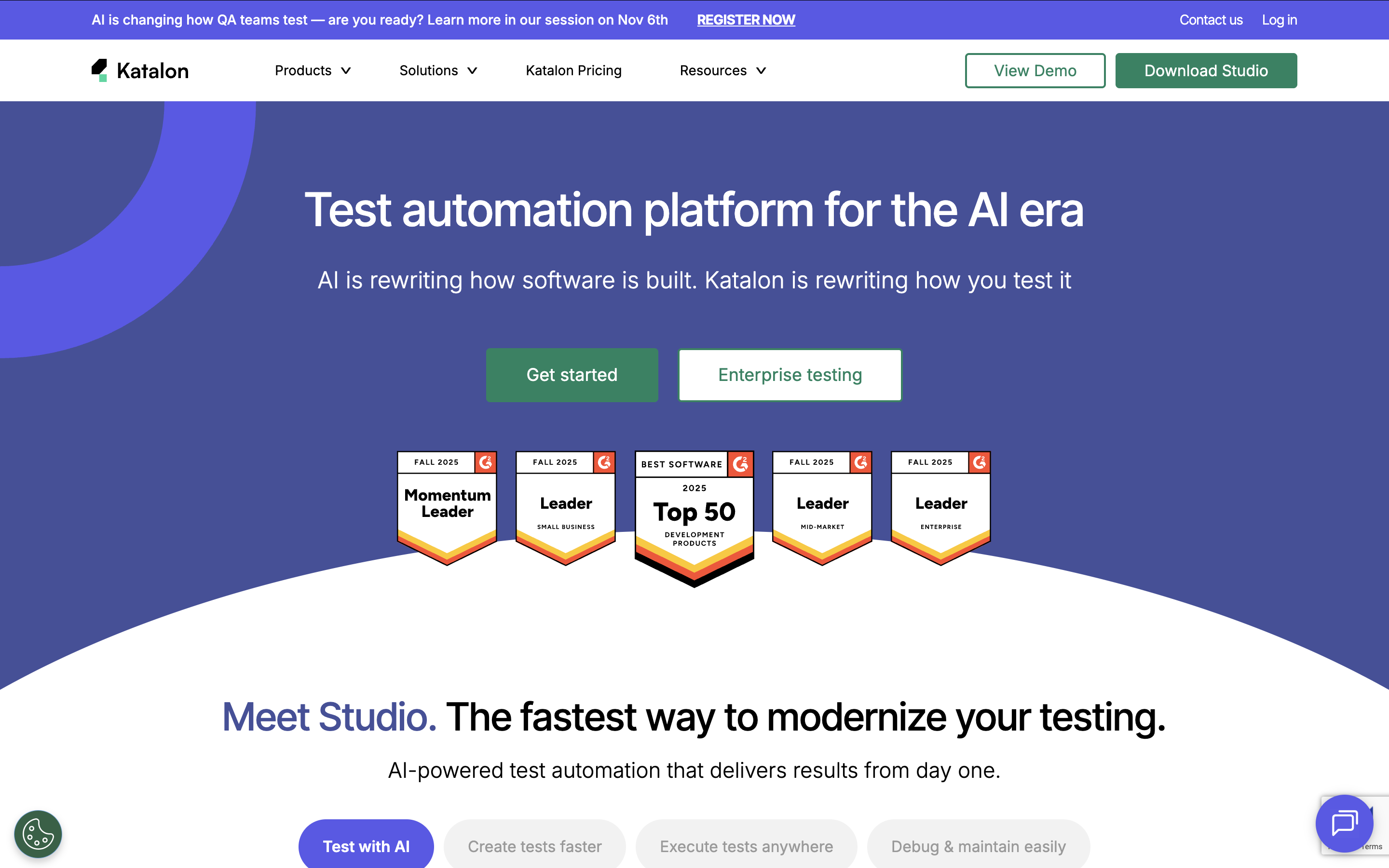
Katalon is an all-in-one automated API testing tool. With Katalon you can:
- Use pre-built API frameworks to automate tests without coding.
- Import requests from OpenAPI, Postman, SoapUI, and WADL.
- Run large-scale API tests with data-driven testing.
- Execute UI + API tests for full coverage.
- Schedule, track, and manage test runs in Studio.
- Integrate with top CI/CD tools.
- Run API tests in parallel from CLI.
Katalon generates detailed reports with metrics to support data-driven decisions.
Visit Katalon Website | Pricing | G2 Reviews
📝 Want a customized automated API testing tool for your org? Share your needs and Katalon can build a tailored solution.
2. Postman (Best for API automation testing)

Postman began as a Chrome extension and evolved into a complete cross-platform API development and testing solution.
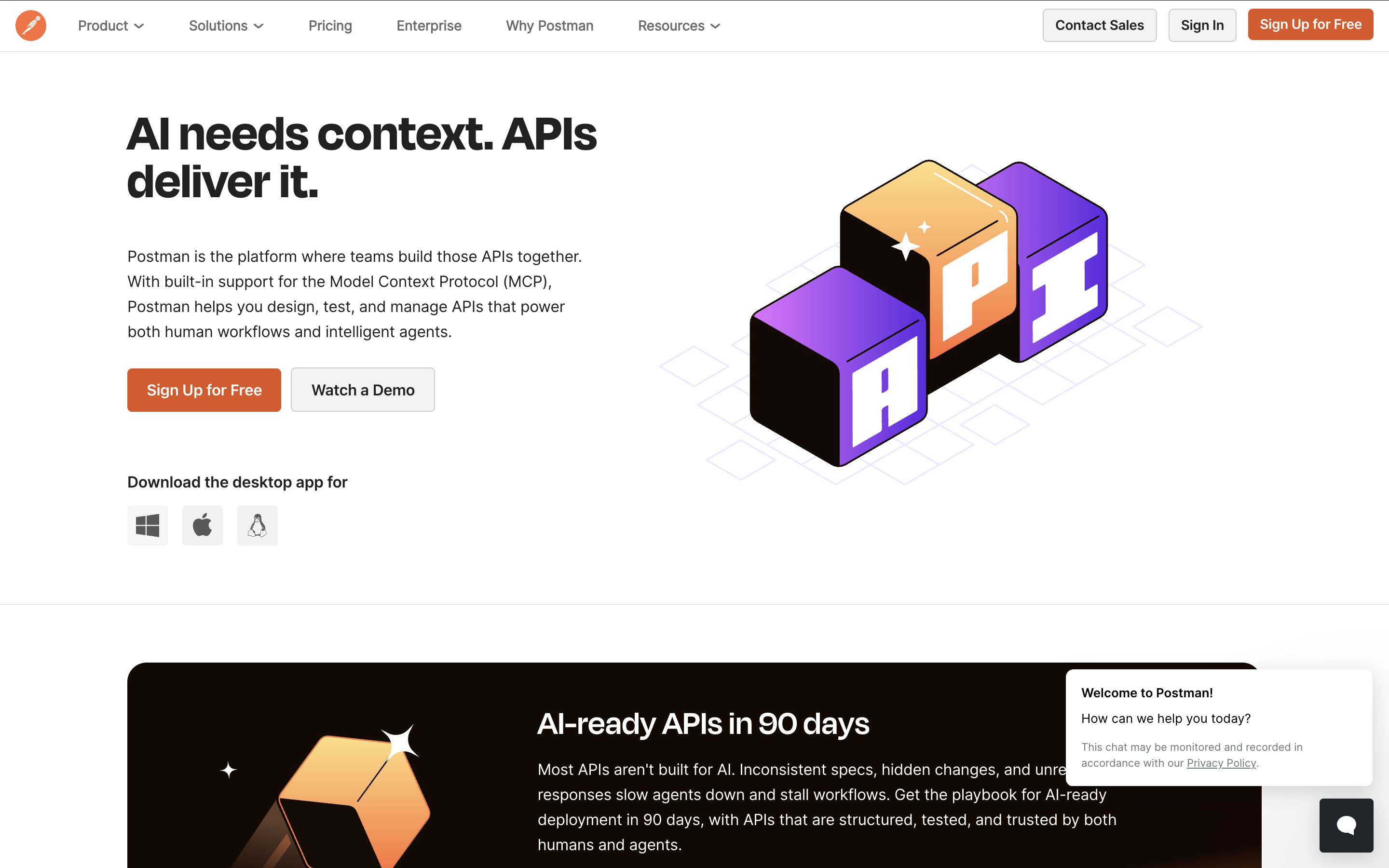
Feature highlights:
- User-friendly REST client with a modern UI
- Supports automated + exploratory API testing
- Cross-platform: Windows, macOS, Linux
- Built-in support for OpenAPI, Swagger, RAML, etc.
- Unified workspace for running, testing, documenting, and monitoring APIs
- Strong collaboration: share collections/tests across teams
- Rich integration ecosystem (GitHub, Jenkins, CI/CD)
Drawbacks:
- Heavy memory usage on large projects
- Advanced features locked behind paid tiers
- Less suitable for deep backend scripting than REST-assured
- Limited CLI support without Newman/Postman API
- Occasional UI lag on lower-spec machines
📚 Read more: Postman alternatives for API testing
Visit Postman Website | G2 Reviews
Pricing: Free – $12/user/month
3. Bruno (Best for developers who want full control)

Bruno is a blazing-fast, offline-first, fully open-source API client designed to rethink how developers manage and test APIs. It even challenges cloud-based tools like Postman and Insomnia.

Instead of relying on cloud sync or proprietary formats, Bruno stores API collections directly in your local filesystem as human-readable, version-controllable .bru files—its own plain-text markup language.
Bruno is great for:
- Developers who prefer plain-text API testing
- Teams working in secure, offline environments
- GitOps-focused teams who want full traceability of API changes
- Open-source enthusiasts and tinkerers looking for scriptable tooling
Pricing: Completely free and open-source under the MIT License
Visit Bruno Website | G2 Reviews
GitHub: Bruno GitHub
4. Apigee (Best for Enterprise-grade API Management)

Apigee is a robust, cross-cloud API management and testing platform for organizations needing to build, secure, monitor, and scale APIs across hybrid and multi-cloud environments. It supports compliance frameworks including PCI DSS, HIPAA, SOC2, and PII—ideal for regulated industries.
Apigee is consistently recognized as a leader in full lifecycle API management and now includes AI-powered developer tools and zero-trust security features.

Source: Google Cloud
Feature highlights:
- Full lifecycle support to design, implement, monitor, and extend APIs
- Multi-step testing and traffic orchestration with JavaScript
- Real-time diagnostics for traffic, error rates, and latency
- Simple API proxy deployment using OpenAPI 3.0
- AI-generated code suggestions and policy creation via Gemini AI
- Debug session REST API and modern flow visualization (v2)
- Data Residency Zones and FIPS-compliant encryption
- API Hub enabled by default to simplify discovery and reuse
In 2025, Apigee adds:
- Native support for Python 3
- Broader OS compatibility (RHEL 9, Rocky Linux 9)
- Higher security with BCFIPS
- More powerful observability tools
Visit Apigee Website | G2 Reviews
Pricing: Contact Sales
5. JMeter (Best for performance and load testing of APIs)

Originally designed for performance and load testing, Apache JMeter has evolved into a versatile tool widely used for functional API testing. It supports a variety of protocols, including HTTP, REST, SOAP, FTP, and more.
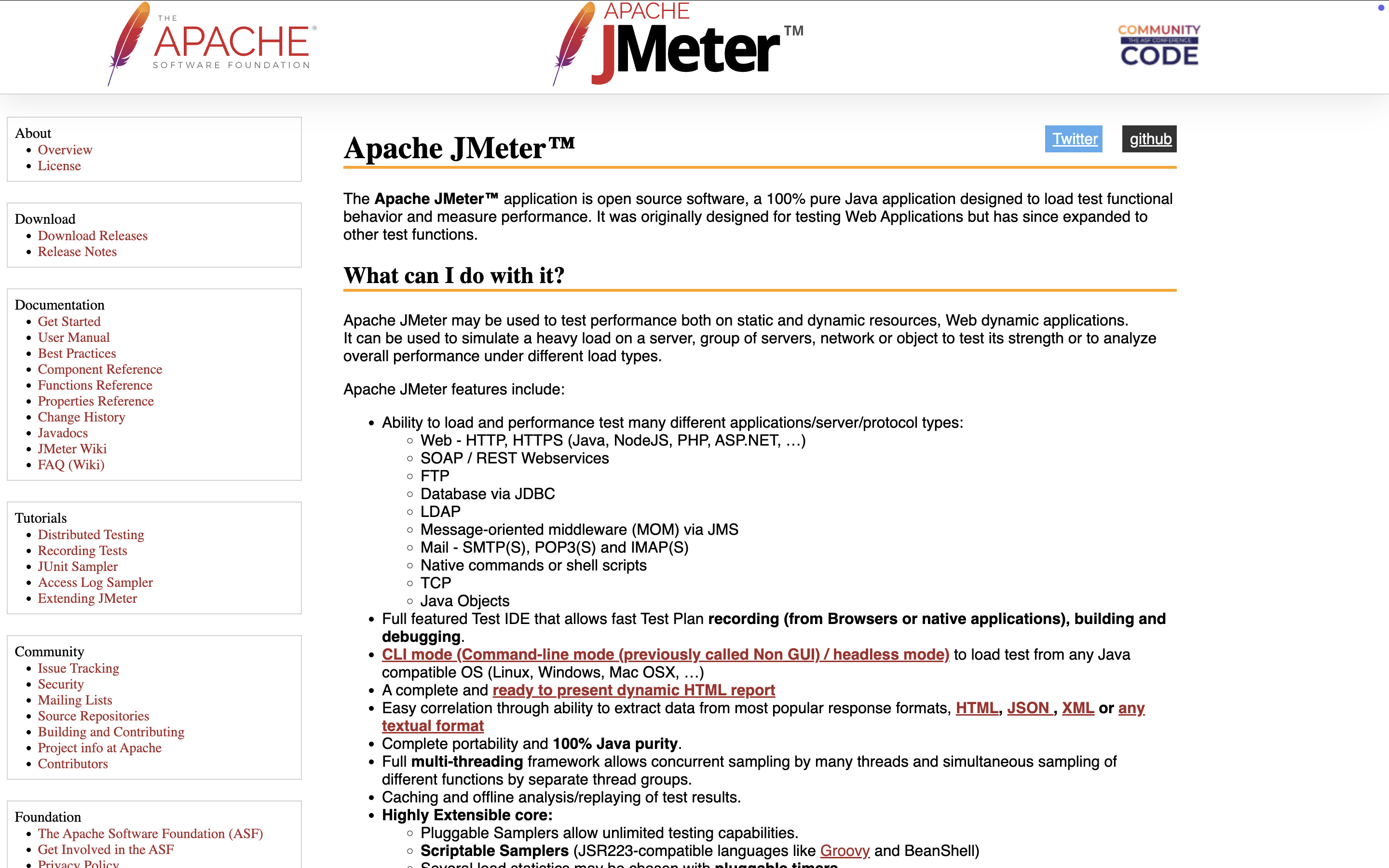
Feature highlights:
- Caching and offline replay of test results for easier debugging and re-analysis
- Built-in CSV support for dynamic test parameters and realistic traffic simulation
- Seamless CI/CD integration (e.g., Jenkins) for automated test execution
- Performance testing for both static and dynamic resources (HTML, APIs, JavaScript, etc.)
- Extended scripting with updated Groovy and BeanShell libraries
- Rich plugin ecosystem supporting reporting, assertions, graphs, and more
Drawbacks:
- Steep learning curve, especially for complex test plans and advanced scripting
- Outdated UI compared to modern tools such as Postman or K6
- High memory usage during large-scale or distributed load tests
- Limited native assertions and reporting without plugins
Visit JMeter Website | G2 Reviews
Pricing: Free
📚 Read More: Top Performance Testing Tools For Your Team
6. HTTPie

HTTPie is a modern, open-source command-line HTTP client built to make interacting with web APIs intuitive, readable, and developer-friendly. Positioned as a cleaner alternative to cURL and Postman, HTTPie simplifies API testing, debugging, web scraping, and automation from the terminal.

Feature highlights:
- Clean, colorized terminal output
- Intuitive syntax
- Built-in JSON parsing and formatting
- Custom headers, data, query strings, and authentication with minimal boilerplate
- Form and file uploads via multipart/form-data
- Persistent sessions using cookie storage
- Wget-like downloads with save-to-disk support
- Works on Linux, macOS, Windows, and FreeBSD
- Easy to script in CI workflows or shell scripts
Here's a quick HTTPie vs Postman vs cURL comparison:
| Tool | Best For | UI/CLI | Use Case |
|---|---|---|---|
| HTTPie | Developer-centric CLI workflows | CLI | Readable, scriptable API interactions |
| Postman | Manual and team-based API testing | GUI | Exploratory testing, team collaboration |
| cURL | Raw power and protocol options | CLI | System-level HTTP requests, scripting |
Visit HTTPie Website | G2 Reviews
7. Assertible (Best for Automated API monitoring & health checks)

Assertible is an automated API testing tool focused on reliability and continuous verification.

Feature highlights:
- Automate API tests throughout the CI/CD pipeline
- Run tests after deployments and integrate with GitHub, Slack, Zapier, and more
- Validate HTTP responses using turnkey assertions
- Automatically update tests when API specs change using Sync
In October 2019, Assertible added encrypted variables for securely storing passwords, tokens, and other sensitive data.
8. SoapUI (Best for Enterprise-grade SOAP and REST testing)

SoapUI is a headless functional API testing tool designed to automate REST and SOAP API testing with minimal effort.
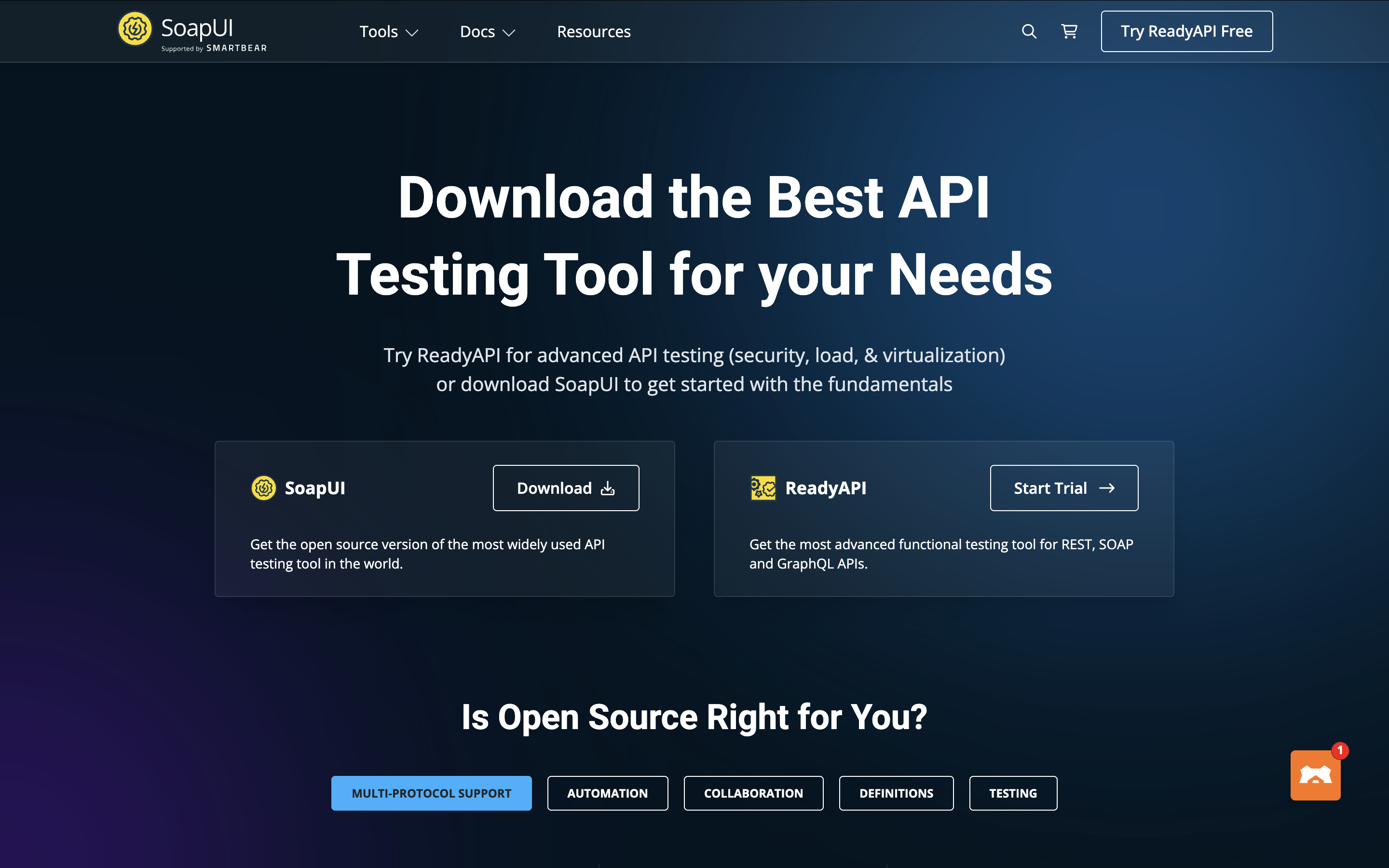
For the Free package, users can:
- Access the full source code and extend capabilities
- Create tests easily with drag-and-drop and point-and-click tools
- Reuse load tests and security scans for functional test cases
For the Pro package, users can:
- Perform powerful data-driven testing using files, databases, or Excel
- Use native CI/CD integrations and asynchronous testing
The latest version, SoapUI 5.7.0, adds GraphQL API support and security improvements by disabling Load/Save project scripts by default.
Visit SoapUI Website | G2 Reviews
9. Karate DSL (Best for Cucumber-style BDD API testing with minimal code)

This open-source API testing tool helps users create scenarios for API-based BDD tests without writing definition steps. KarateDSL automatically generates the step definitions, allowing teams to quickly start API testing.

Feature highlights:
- Built on top of Cucumber-JVM
- Run tests and generate reports like any standard Java project
- Supports configuration switching/staging and multithreaded parallel execution
The latest revision, Karate UI 1.3.0, supports Java 8 and includes redesigned HTML reports, call-Single-Cache, Karate Robot for Windows desktop automation, and improved UI Test tree walking. Karate UI lets you write tests in any language able to handle HTTP, JSON, or XML.
Visit Karate Labs Website | G2 Reviews
Pricing: Free
10. Rest Console (Best lightweight manual API testing in the browser)

Rest Console is a REST/HTTP client for Google Chrome that helps users visualize, construct, and send custom HTTP requests when testing RESTful APIs.

It offers an intuitive interface for composing requests, inspecting responses, and managing headers, bodies, and authentication.
Feature highlights:
- Construct POST or PUT bodies using raw input
- Modify custom headers through a simple UI
- Easily create query parameters
- Supports Plain, Basic, and OAuth authentication
- Customizable interface
The latest version, Rest Console v4.0.2, includes OAuth improvements, collapsible sections, clickable links in responses, and UI enhancements.
Pricing: Free
11. PyRestTest (Simple YAML-based API test automation in Python)

PyRestTest is a Python-based REST API testing tool that lets you define tests using JSON or YAML—no coding required.

Feature highlights:
- Generate and validate complete test scenarios
- Easy on-server deployment for smoke tests and health checks
- Returns exit codes for CI/CD and orchestration tool integration
Pricing: Free
12. Hoppscotch (Modern, fast, open-source API testing in the browser)

Hoppscotch is a free, open-source API request builder known for its speed and minimalistic UI. Originally designed as a lightweight Postman alternative, it lets developers send HTTP requests, inspect responses, and copy results directly in the browser.

Feature highlights:
- Instant-loading, minimal UI
- Real-time request/response panel
- Supports REST, GraphQL, WebSocket, SSE, and experimental gRPC
- Environment variables, pre-request scripts, and collections
- Export/import requests for collaboration
- One-click request copying and code snippet generation
- Easy to self-host and customize
- Built using modern web tech (Vue.js, PWA-ready)
Pricing: Free
13. Taurus (Performance testing automation wrapper for JMeter, Gatling, Locust, etc.)

Taurus is an open-source test automation framework that simplifies performance and API testing by abstracting complex tools like JMeter, Gatling, and Locust.
Teams can define tests using human-readable YAML files, no programming needed.

Taurus is popular among teams that need CI/CD-friendly automated performance testing without heavy scripting.
Feature highlights:
- Write test plans in YAML
- Supports JMeter, Gatling, Locust, The Grinder, and Selenium
- Excellent CI/CD integration
- Live console and graphical reports
- Supports functional and performance testing of APIs, UIs, and services
- Great for load testing and automated benchmarking
Pricing: Free
14. Citrus Framework (Complex end-to-end integration testing)

Citrus is an open-source integration testing framework for message-based systems. It provides a fluent Java DSL for defining automated interactions across HTTP, REST, SOAP, JMS, Kafka, MQTT, and more.

Feature highlights:
- Java fluent DSL for complex messaging flows
- Acts as both consumer and producer for full end-to-end simulations
- Supports HTTP, SOAP, REST, JMS, Kafka, MQTT, TCP/UDP, and more
- Built-in schema validation, XPath/JSONPath assertions, and scripting
- Compatible with JUnit, TestNG, Maven, and Gradle
Best for:
- Java teams testing microservices or message-driven architectures
- Projects requiring simulation of external systems
- Developers needing fine-grained control of messaging and validation logic
Visit Citrus Framework Website
15. Airborne (RSpec-style API testing in Ruby)

Airborne is a lightweight Ruby-based API automation framework built on top of RSpec. Designed for teams who prefer a code-first workflow, it enables fast and expressive HTTP tests without relying on a GUI.

Feature highlights:
- Clean, declarative syntax for API assertions using RSpec-style matchers
- Designed specifically for REST API testing
- Pure code-based workflow — tests written directly in Ruby
- Supports JSON validation, status code checks, and header assertions
- Easy integration with CI/CD pipelines
- Fully open-source and free
Pricing: Free
Conclusion
While this list covers some of the best API testing tools available today, no single solution fits every scenario. Each tool comes with its own strengths and trade-offs. The best approach is to experiment with a few options and choose the one that aligns most closely with your team’s workflows, skillsets, and long-term testing requirements.
|
FAQs on Automated API Testing Tools
What are API testing tools?
API testing tools are software solutions designed to automate the process of validating Application Programming Interfaces (APIs). They help ensure that APIs function correctly, perform efficiently, and maintain security by sending requests, receiving responses, and verifying outcomes.
Which automated API testing tools are considered top choices for 2025?
According to the article, some of the top automated API testing tools for 2025 include Katalon Studio, Postman, Apigee, JMeter, REST-assured, Assertible, and Soap UI, among a comprehensive list of 15.
What key factors should be considered when choosing an API testing tool?
When selecting an API testing tool, important factors to consider include its support for basic API requirements (like HTTP requests), overall complexity and learning curve, compatibility with your CI/CD pipeline, interoperability with other tools in your tech stack (e.g., Jira, Git), and its user-friendliness for non-technical team members.
Is Katalon Studio suitable for API testing?
Yes, Katalon Studio is highly suitable for API testing and is recognized as a leading solution. It offers features like an easy-to-use UI, support for REST/SOAP requests, data-driven testing, native CI/CD integrations, and fluent assertion support in BDD style.
Are there any free or open-source API testing tools mentioned in the list?
Yes, the article highlights several free and open-source API testing tools, including JMeter, REST-assured, Karate DSL, Rest Console, Pyresttest, Hoppscotch, Taurus, Citrus Framework, and Airborne. Katalon Studio and Postman also offer free tiers or versions.

